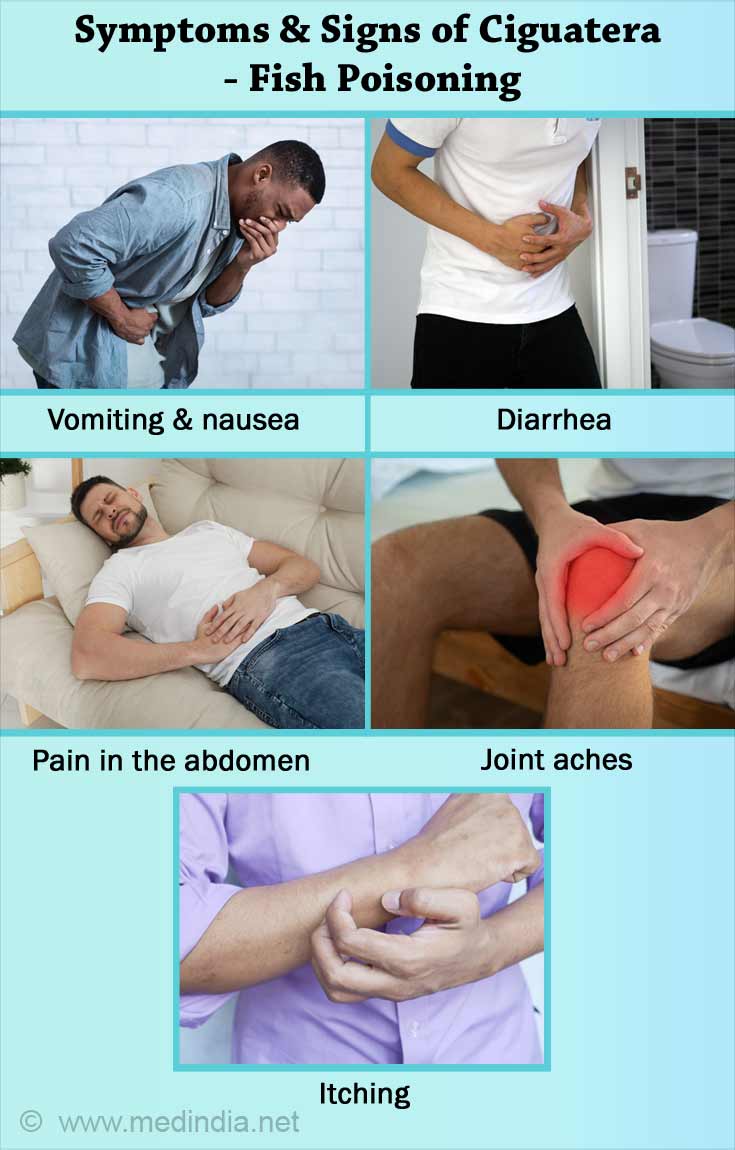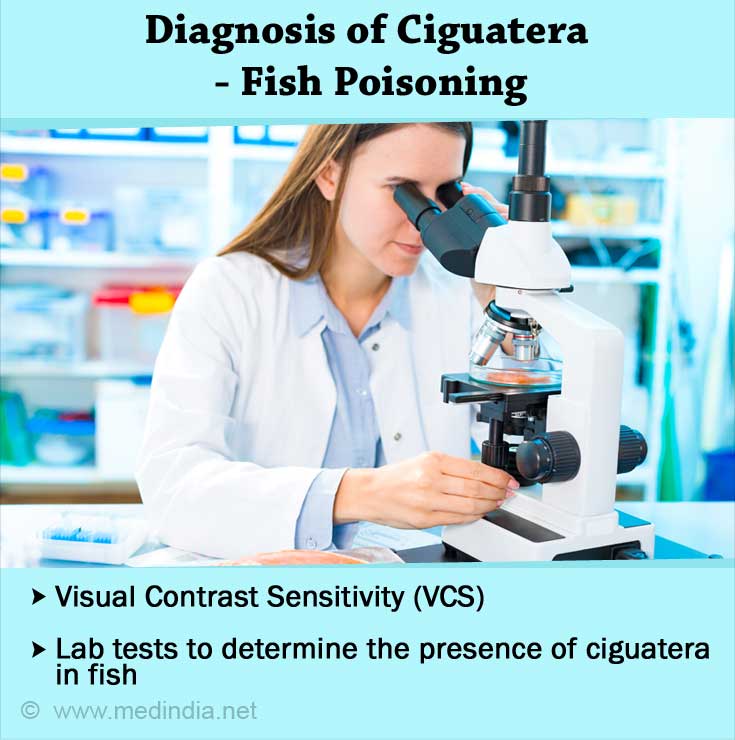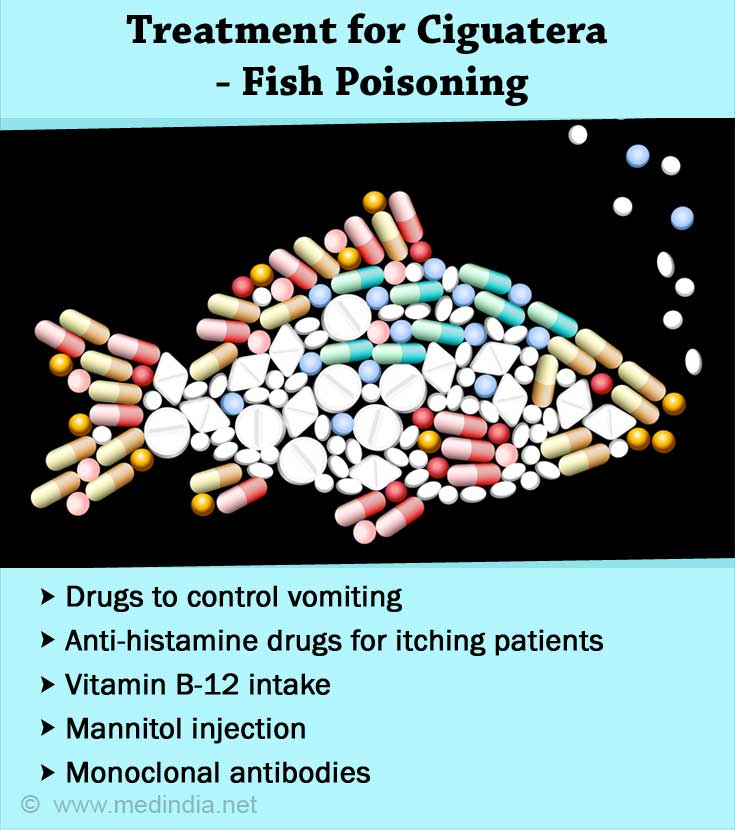- Melissa A. Friedman, Lora E. Fleming, Mercedes Fernandez, Paul Bienfang, Kathleen Schrank, Robert Dickey, Marie- Yasmin Bottein, Lorraine Backer, Ram Ayyar, Richard Weisman, Sharon Watkins, Ray Granade and Andrew Reich, 'Ciguatera fish poisoning: Treatment, Prevention and management', Marine Drugs 2009
- Laser ED, Shenefelt PD, 'Hypnosis to alleviate the symptoms of Ciguatera toxicity: A case study', American Journal of Clinical Hypnosis 2012 January
- Inoue M, Lee N, Tsumuraya N, Fujii L, Hirama M, 'Use of monoclonal antibodies as an effective strategy for treatment of Ciguatera poisoning', Toxicon 2009
- Bourdy G, Cabalion P, Amade P, Laurent G, 'Traditional Remedies used in the Western Pacific for the treatment of Ciguatera Poisoning', Journal of Ethnopharmacology, 1992
- About Ciguatera - (http://www.cdc.gov/nceh/ciguatera/)
- Ciguatera Fish Poisoning - (https://www.iamat.org/risks/ciguatera-fish-poisoning)
- Frequently Asked Questions (FAQ) Ciguatera Toxin - (http://www.ncf-net.org/library/CiguateraFAQ.htm)
What is Ciguatera?
Ciguatera or ciguatera fish poisoning is a form of food poisoning that is caused by the consumption of fish that contain the ciguatera toxin.
Around 50,000 people are affected by Ciguatera every year in tropical and sub-tropical regions.
What is Ciguatera Toxin?
- Ciguatera toxin is a harmful substance produced by the algae Gambierdiscus toxicus
- The toxin especially accumulates in the liver, head, intestines and eggs of the fish.
- Herbivorous fish eat the algae but the toxin does not harm the fish.
- Humans are affected when they consume such infected fish
- Bigger carnivorous fish usually have higher concentrations of the toxin as they eat plenty of smaller fish with the toxin in them
- The toxin is odourless and colorless
- The toxin is not destroyed by cooking and is therefore present even in cooked fish
- Ciguateric fish look normal and show no change in smell or color which makes it difficult to detect their presence in fish before consumption
What are the Symptoms and Signs of Ciguatera?
The toxin acts on certain channels called voltage-gated sodium channels located on the cells of the body resulting in digestive, cardiac and nervous symptoms. The symptoms may start within 15 minutes of consumption or may take even up to 24 hours to become evident.
Digestive tract symptoms:
- Pain while passing stools
- Vomiting and nausea
- Diarrhoea
- Pain in the abdomen

Cardiac symptoms:
- Fluid accumulation in lungs
- Slow heart rate
- Fall in blood pressure
Neurological symptoms:
- One of the most classic symptoms is feeling cold objects hot and vice versa- The paradoxical temperature reversal is may be due to the action of the toxin on certain nerves
- Joint aches
- Anxiety
- Depression
- Memory loss
- Tingling and numbness in tongue, around mouth, and in limbs
- Teeth begin to pain, and feel shaky and may fall
- Loss of balance
- General weakness
- Vertigo
- Respiratory paralysis
- In severe cases- coma
- Itching
Apart from these symptoms, there are a few general symptoms that are associated with ciguatera poisoning:
- Excessive sweating
- Pain during ejaculation
- Pain while passing urine
- Chills
- Muscle pain
- Metallic taste
- Salivation
- Tearing from the eyes
- Rashes in the skin
Ciguatera poisoning does not normally lead to death if the patient receives the right medical care at the right time. Death may occur due to dehydration, extreme fall in blood pressure, or respiratory depression.
What are the Chronic Symptoms of Ciguatera?
After the initial phase of illness, there is period of weakness that can last from a few days to a few weeks. Some patients continue to have neurological symptoms like generalized fatigue, depression, itching and abnormal sensations of the extremities.
In extremely rare cases, psychological symptoms persist even for many years after the initial episode of poisoning.
What are the First aid Methods that Need to be Followed?
An individual showing a few of the above mentioned symptoms of Ciguatera poisoning has to be taken to the doctor immediately. In the meanwhile, the patient should be:
- Hydrated. Repeated vomiting and diarrhoea could result in dehydration and even small sips of water can help avoid it till the patient reaches emergency.
- Kept away from nuts, oil from nuts, fish, oil from fish and drinking alcohol as they could aggravate symptoms.
How to Diagnose Ciguatera Poisoning?
Ciguatera is reliably diagnosed by assessing the symptoms and determining if others who consumed the fish suffered from similar symptoms. Since the symptoms usually occur within a few hours of consumption of the fishit is easy to trace back the source of poisoning.
A new method of diagnosis is the Visual Contrast Sensitivity (VCS). This study is based on the ability of an individual to discern the colors black, grey and white, which is usually impaired in patients affected by a neurotoxin. This test is inexpensive and portable, however, it is not specific only for ciguatera toxin but for all neurotoxins caused by dinoflagellate microorganisms.

Ciguatera poisoning could be misdiagnosed with other forms of neurotoxic poisoning like shellfish poisoning, puffer fish toxicity, botulism, pesticide poisoning etc. For conclusive diagnosis, the fish can be subjected to laboratory testing to determine if it was infected with ciguatera. Though there are no diagnostic procedures for humans, there exist conclusive lab tests to determine the presence of ciguatera in fish.
How do you Treat Ciguatera?
Ciguatera food poisoning is treated based on the symptoms expressed by the patient. There is no specific antidote for this food-borne illness that is currently available in the market.

- Earlier, ipecac was used to induce vomiting so that the ingested contaminated food is removed from the system. This is however no longer followed as this method resulted in excessive fluid loss. Instead, activated charcoal is administered within 3 to 4 hours of consumption of the contaminated food so that it prevents absorption of the toxin from the digestive tract.
- Drugs for vomiting are administered to control vomiting and nausea while IV fluids help to replenish the fluid loss. It is important to keep the patient hydrated.
- A good cold shower is recommended for patients with itching along with anti-histamine drugs
- Low blood pressure is managed using IV fluids.
- Vitamin B-12 intake has been found to alleviate a lot of symptoms of Ciguatera toxicity.
- Mannitol is found to be effective when injected into the vein. It appears to act through multiple mechanisms. It should not be used in patients with dehydration unless the dehydration has been corrected.
- Laser and Shenefeld in a case study published in the American Journal of Clinical Hypnosis in 2012 detail the symptoms of a patient with burning feet and hands who did not find relief using other methods but found relief after a single session of clinical hypnosis.
- Inoue M and colleagues published their study in the Toxicon in June 2009 about the use of monoclonal antibodies in the treatment of ciguatera toxicity. This would help in more effective management of the poisoning.
Prevention of Ciguatera
Ciguatera toxin is usually concentrated in large warm water fish like barracuda, black grouper, blackfin snapper etc. Avoid eating reef fish over 2.5 kgs or large fillet of fish
Liver, roe, head and intestine of smaller reef fish should also be avoided. Ciguatera tends to accumulate in such regions of the body.
Restraining from eating such fish is the best method of prevention as there is no preventive medicine currently available and diagnostic test kits are very expensive.
People who have been affected by ciguatera toxin should avoid eating large reef fish for at least 6 months and avoid drinking alcohol for 3 months.
What are Traditional and Folk Remedies Used to Treat or Prevent Ciguatera?
- Some Australians believe that fish should first be offered to cats, if they eat it and don’t fall ill, then it should be consumed by humans
- Some people believe that fish should be placed amongst ants, ants inherently know if the fish contains ciguatera and will avoid it.
- Wrapping the fish in certain plants species like Ficus Spp. is believed to destroy the toxin
- More than 64 species of plants are used to either treat or prevent ciguatera toxicity.









